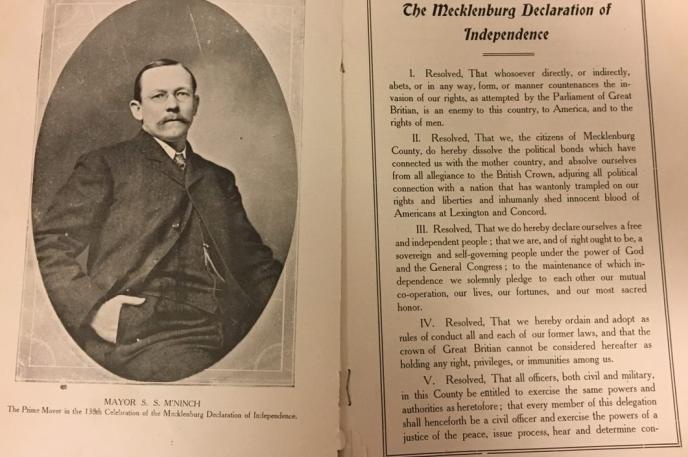
Part III: the Mecklenburg Declaration of Independence meets controversy
May 17, 2019
(Already read Part II? Jump ahead to Part IV.)
NOTE: This post is part three in a four-part series that explores the Mecklenburg Declaration of Independence. Don’t forget to read parts one and two.
Either these resolutions are a plagiarism from Mr. Jefferson's Declaration of Independence, or Mr. Jefferson's Declaration of Independence is a plagiarism from those resolutions.
—John Adams, August 21, 1819
The Mecklenburg Declaration and the Declaration of Independence had several similar phrases, including "dissolve the political bands which have connected," "absolve ourselves from all allegiance to the British Crown," "are, and of right ought to be" and "pledge to each other, our mutual cooperation, our lives, our fortunes, and our most sacred honor."
Did Thomas Jefferson, the principal author of the American Declaration of Independence, use the Mecklenburg Declaration as a source? Had he seen the Mecklenburg Declaration? Was the language used in both documents common for the day?
 Former President Thomas Jefferson, principal author of the United States Declaration of Independence, suspected that the Mecklenburg Declaration was a hoax. John Adams agreed with Jefferson. When Adams read Dr. Alexander's 1819 article in a Massachusetts newspaper, he was astonished because he had never previously heard of the Mecklenburg Declaration. He immediately assumed, as he wrote a friend, that Jefferson had "copied the spirit, the sense, and the expressions of it verbatim into his Declaration of the 4th of July 1776." Adams had played a role in getting the Continental Congress to declare independence in 1776 and was, therefore, somewhat resentful that Jefferson received most of the praise. Adams sent a copy of the article to get Jefferson’s reaction.
Former President Thomas Jefferson, principal author of the United States Declaration of Independence, suspected that the Mecklenburg Declaration was a hoax. John Adams agreed with Jefferson. When Adams read Dr. Alexander's 1819 article in a Massachusetts newspaper, he was astonished because he had never previously heard of the Mecklenburg Declaration. He immediately assumed, as he wrote a friend, that Jefferson had "copied the spirit, the sense, and the expressions of it verbatim into his Declaration of the 4th of July 1776." Adams had played a role in getting the Continental Congress to declare independence in 1776 and was, therefore, somewhat resentful that Jefferson received most of the praise. Adams sent a copy of the article to get Jefferson’s reaction.
Jefferson replied that, like Adams, he had never heard of the Mecklenburg Declaration before. Jefferson found it curious that historians of the American Revolution, even those from North Carolina and nearby Virginia, had never previously mentioned it. He also found it suspicious that the original was lost in a fire and that most of the eyewitnesses were now dead. Jefferson wrote that while he could not claim for certain that the Mecklenburg Declaration was a fabrication, "I shall believe it such until positive and solemn proof of its authenticity shall be produced."
Jefferson's argument, Adams wrote in reply, "has entirely convinced me that the Mecklenburg [sic] Resolutions are a fiction.” Thus began centuries of controversy.
North Carolina Senator Nathaniel Macon collected eyewitness testimony to the events described in the article. The then elderly witnesses did not agree with every detail, but they generally corroborated the story that a declaration of independence had been publicly read in Charlotte, although they were not all certain about the date. Perhaps most importantly, 88-year-old Captain James Jack was still alive and was able to confirm that he delivered a declaration of independence to the Continental Congress that had been adopted in May 1775.
Enjoying reading about the Mecklenburg Declaration of Independence? Stay posted for installment three of this four-part series which leads up to Meck Dec Day on May 20. Expect the next installment in this series on Monday, May 20.
